AI in construction isn't coming—it's already here, but it's not one-size-fits-all.
The most costly delays often happen before the first shovel hits the ground. That's why the most impactful AI companies are those solving specific, expensive problems.
Construction AI companies are key drivers of this revolution. They have created programs that can enhance safety protocols and optimize project management capabilities.
This list breaks down the top 10 construction AI companies by the challenge they tackle, starting with the platform that uses AI to fix the broken bidding process: Downtobid.
Note: If you are looking for a construction ai company to read construction drawings, extract project scopes, speed up bid invitations, automate follow ups, and leverage a verified sub list, try Downtobid. You'll save months of time creating bid packages, and increase subcontractor response rate. Click here for a free demo.
Key Takeaways
- The best AI tools don't try to do everything; they excel at one thing, whether it's bidding (Downtobid), robotics (Dusty), or aerial mapping (AirWorks)
- Downtobid leads preconstruction by reading drawings and automatically matching qualified subcontractors.
- Specialized AI handles robotics, aerial monitoring, and 3D modeling for specific project requirements.
- Advanced platforms offer predictive scheduling and workforce management through data analysis.
- Most AI tools require high upfront costs and training, favoring larger operations.
Most Innovative Construction Companies Using AI
The construction industry has changed dramatically. AI companies are now handling tasks that used to take weeks of manual work - from reading construction drawings to managing subcontractor networks.
These aren't just tech companies with construction buzzwords. They're solving real problems that cost you time and money every day.
What Problem Are You Solving? A Guide to Construction AI
- AI for Preconstruction & Bidding: Downtobid (Automates scope detection, sub matching, bid invites, and bid tracking)
- AI for the Physical Jobsite: Dusty Robotics, Versatile (Robotics and on-site monitoring)
- AI for Planning & Modeling: OpenSpace, Caidio (3D modeling and progress tracking)
- AI for Data & Analytics: Kwant.ai, BuildStream (Predictive scheduling and workforce management)
- AI for Specialized Tasks: AirWorks (Aerial data), Nyfty.ai (Procurement)
Here are the 10 construction AI companies that are actually making a difference in how projects get built.
1. Downtobid - Best for Preconstruction

Downtobid is a construction bid management software for general contractors, subcontractors, and material vendors. While other AI companies focus on the build phase, Downtobid owns the preconstruction process.
We created this program to respond to generic construction AI companies offering basic services. Our clients wanted a program that could handle sophisticated tasks, like reviewing bid documents and recruiting qualified subcontractors.
Who is Downtobid For?
Downtobid isn’t just any other top bid management software. We’re a game changer. Our AI streamlines bid management by reviewing lengthy construction documents for completeness and accuracy. It also easily detects scope, helping subcontractors identify potential construction jobs and better understand project requirements. Who benefits more from using our platform?
Commercial General Contractors
General contractors use our software to simplify bid management and improve subcontractor collaboration. Our software creates personalized bid invites using ready-made templates that increase bid participation.
The centralized communication ensures real-time information, documents, and update sharing to save time and improve project efficiency. The software reduces the administrative overhead, helping them operate within a budget.
For GCs, the weeks spent manually turning plans into bid packages represent the single biggest opportunity for AI to save time and reduce risk.
For Trade Contractors
Trade contractors use our software to receive bid invites and find new opportunities. They can review, accept, or reject bid invites without needing additional tools.
They can also use our software to create and submit comprehensive bids to desirable construction projects. Our bid tracking tool ensures they monitor their bids’ performance and take notes to improve future bidding strategies.
Our sub-centric Planroom helps them access relevant documents, like blueprints and construction plans. They can also use the Planroom to identify new opportunities without reviewing lengthy documents.
Features of Downtobid
Our software has some amazing features, making it one of the best in the construction industry. Downtobid's AI is transforming the preconstruction process.
- The Manual Way: Estimators spend days page-turning, manually scoping, and cold-emailing subs from unverified lists.
- The Downtobid Way: AI analyzes plans in minutes, auto-generates scopes, matches pre-vetted local subs, and sends personalized invites that get 30%+ response rates.
- The Bottom Line: What took weeks now takes hours, with more complete bid coverage and less risk of missing critical scopes.
Here are the features we offer:
AI Copilot
The AI copilot is the beating heart of our software, handling all administrative tasks. Think of it as your personal assistant, responsible for tasks such as the AI reviewing construction documents for completeness and accuracy. This approach helps you focus on complex tasks, such as identifying new opportunities and contract negotiations.
The AI Copilot reviews documents with great accuracy to produce zero scope gaps before a single invite is sent.
Our AI speeds up scope detection by reviewing lengthy construction documents. This way, you won’t have to hire additional team members to handle the task. In some way, it saves you additional costs and speeds up the preconstruction process.
The AI Copilot has significantly improved subcontractor recruitment by matching qualified local subs with detected scopes. This approach saves you the time and pressure of contacting many subs, many of whom might not be the right fit or available to take on new projects. The time we help construction professionals save is why we are at the top of the best construction artificial intelligence tools.
Personalized Bid Invites
Generic bid invites resembling boring job interviews no longer cut it in the construction industry. Our software lets you personalize bid invites to make each bid unique and targeted. We include the subcontractors’ names, company names, a scope summary, and reasons we believe they’re the right fit.
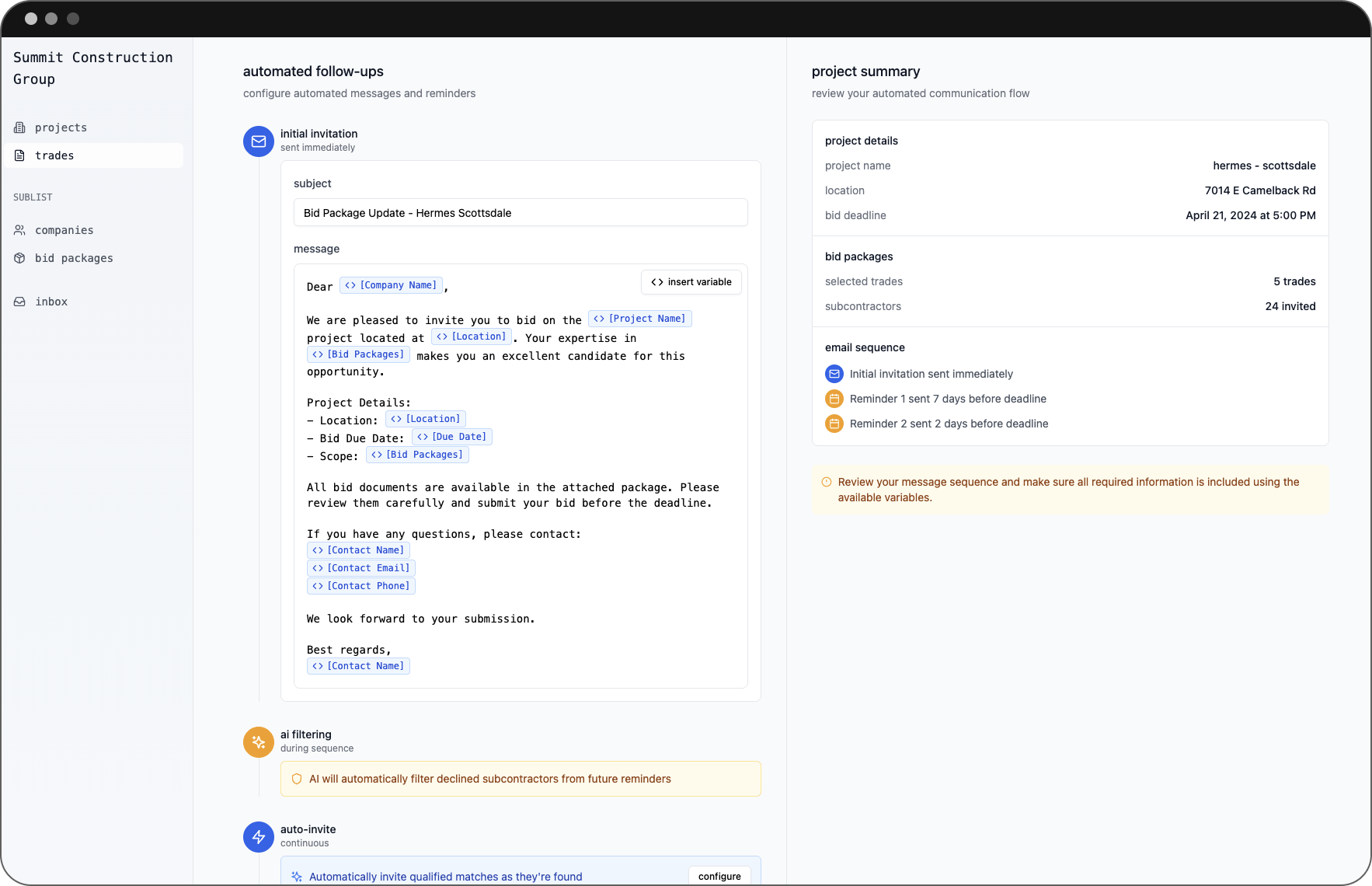
This approach has increased bid participation by 30%, helping general contractors reach more qualified subs.
Enhanced Collaboration
Our software is built for teamwork and collaboration. We have centralized communication to ensure team members receive timely information, updates, and revisions. We use a threaded message approach, which helps users track specific emails without combing through countless emails. The in-built messaging tool ensures you can read and respond to emails through the platform without needing your email app.
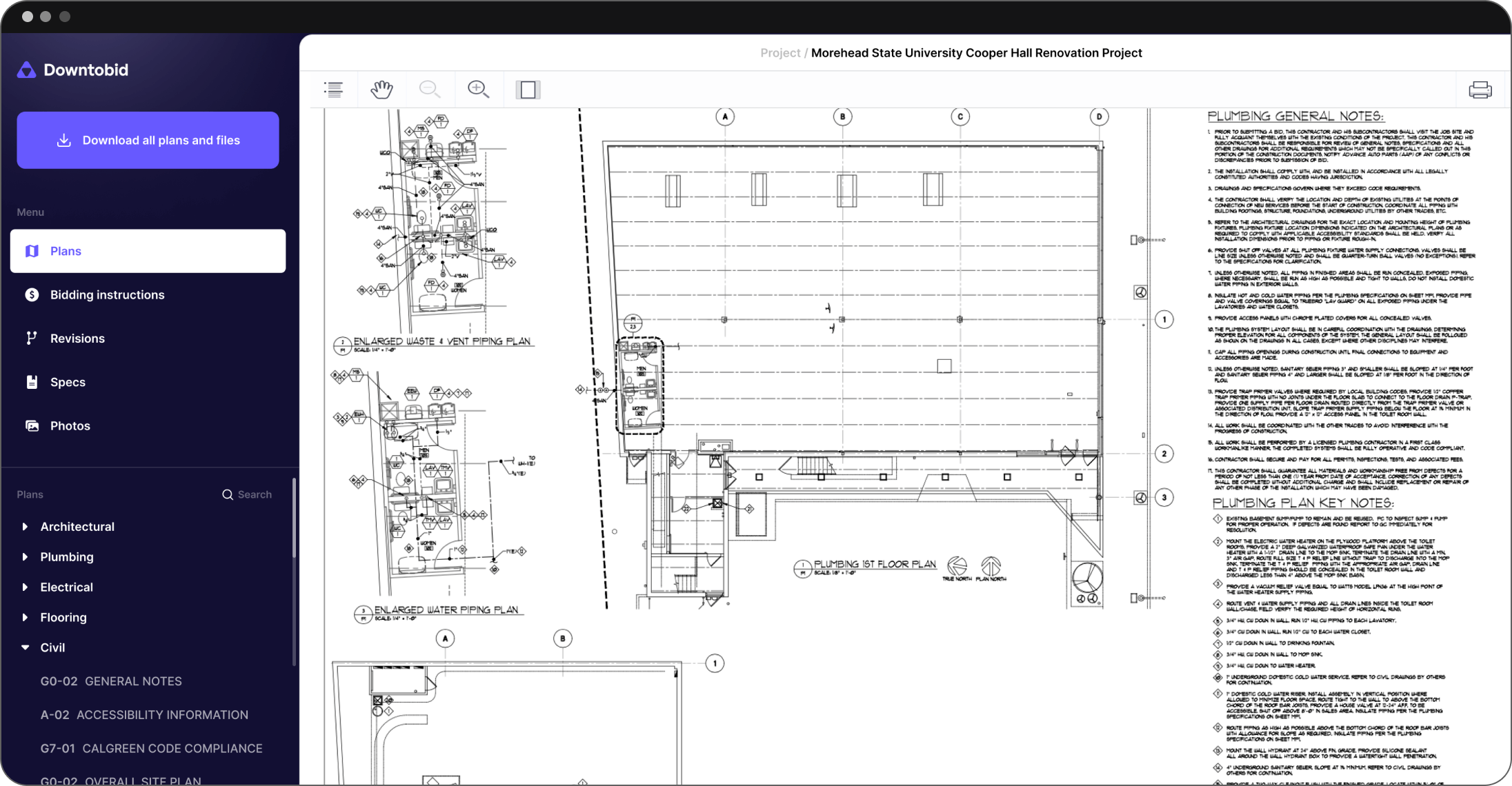
Our subcentric planroom contains all construction documents, ensuring team members are working on the latest information. This approach eliminates errors, scope gaps, and miscommunication.
Project managers can assign tasks and track progress from a centralized platform to ensure timely project delivery.
Benefits of Using Downtobid
Downtobid is changing the construction industry one bid at a time. Our software has streamlined the bidding process, saving you money and time. Here are a few benefits of using our software.
100% Bid Coverage (+ Bid Efficiency)
Our software improves your chances of winning more projects and exploring new opportunities. You’ll receive timely updates about new construction projects to ensure you don’t miss any opportunity. You can also use our search and filter tools to identify new construction jobs matching your specific criteria, such as budget, time, and location.
Our tools ability to read and extract construction scopes from project plans saves you a ton of manual entry work and time.
We also help you find reliable subcontractors by providing a network of pre-qualified professionals. This approach saves you time and reduces the risk of working with unreliable subcontractors.
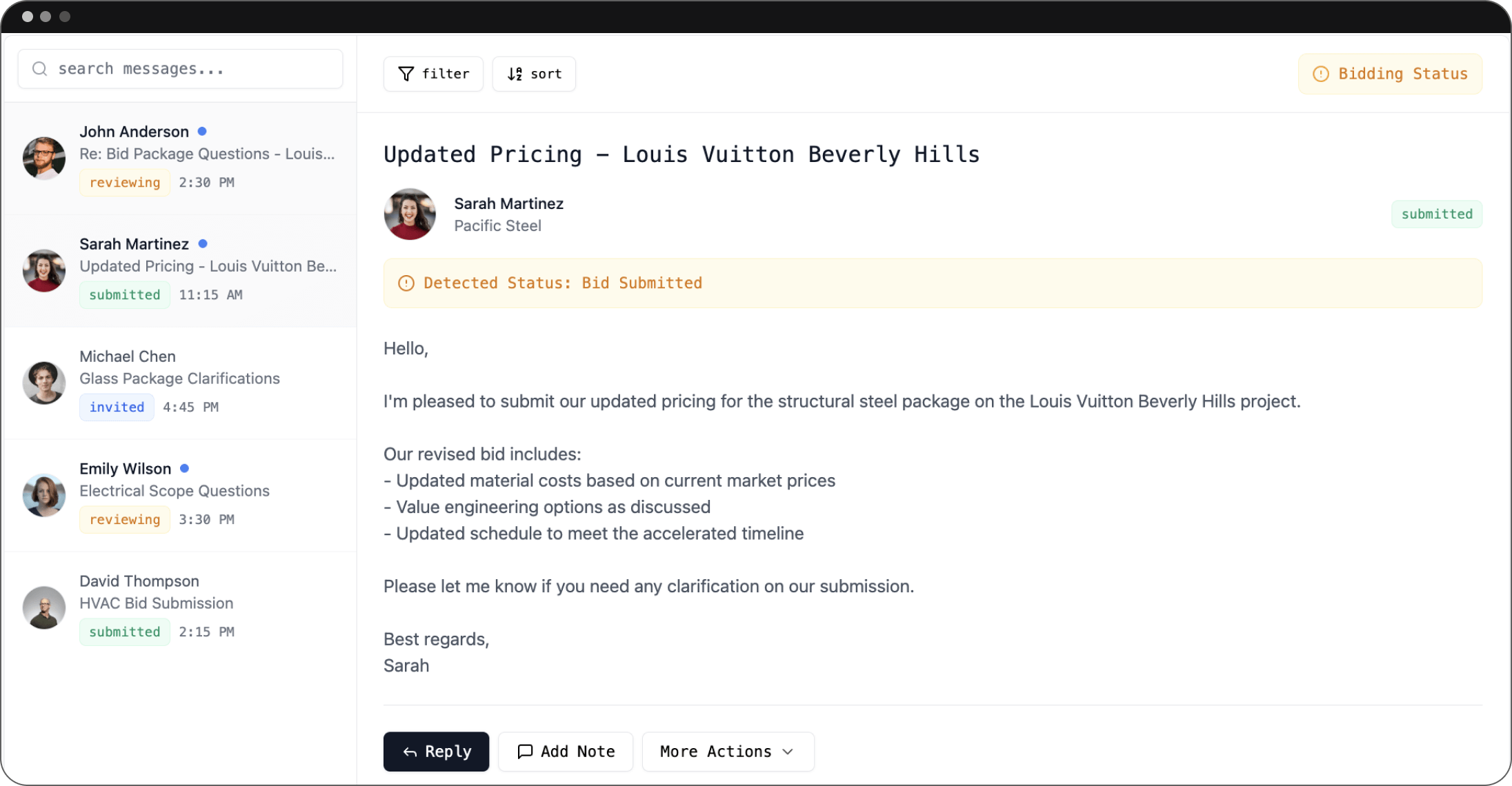
We also have project-specific data and pre-approved bid templates to help you quickly create bid documents. This approach saves you time and reduces errors due to minimal manual data entry.
Our software improves collaboration through streamlined communication and centralized document management. Teams can share real-time information and data to beat project timelines.
The project tracking tools help project managers track progress, identify issues earlier, and take corrective measures. They also benefit from data insights to improve their bid preparation, strategy and increase their chances of winning more projects.
Increase Subcontractor Response Rate
Unlike other platforms where you’ll have to work twice as hard for subcontractor response, you’ll receive around 30% responses for every bid invite you send. That’s why we’re among the best bid preparation software in the industry.
We have invested heavily in features like personalized bid invites that entice subs to respond to bid invites. We also have timely spaced follow-ups to ensure you reach more qualified subs. Forget about blasting emails, hoping for something to stick. We use a curated subcontractor recruitment approach to help you get the best subs and build long-lasting relationships.
Downtobid Verified Network
We’re very committed to ensuring general contractors only work with the most qualified subcontractors. That’s why we verify every subcontractor in our network database. We ensure they have the experience and capabilities to handle projects within their specialty.
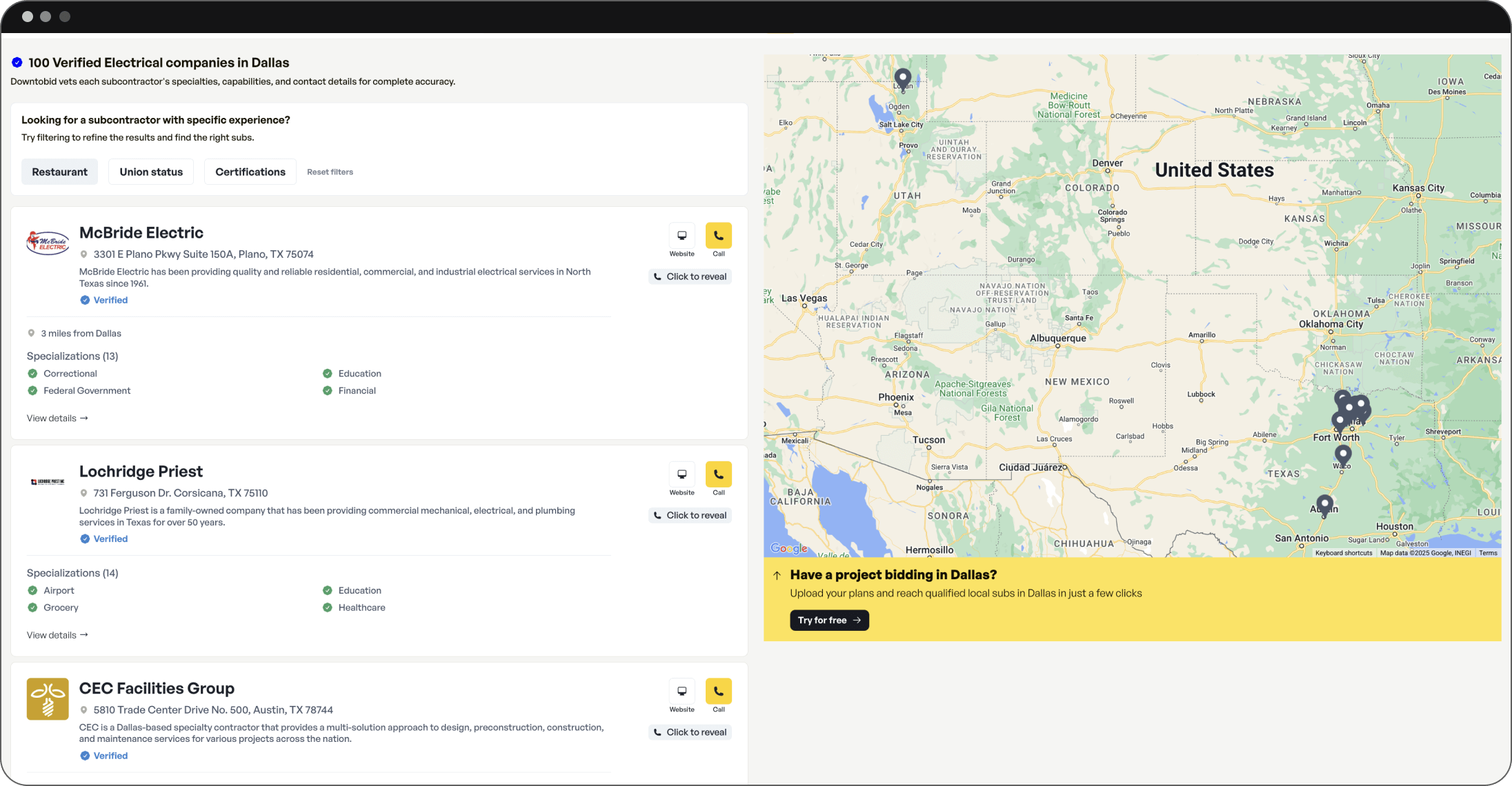
Our AI also scans the database to eliminate duplicate information. We also encourage our subs to update their contact details to improve communication with interested general contractors. This approach eliminates undesirable subcontractors, ensuring you only work with serious construction professionals who are ready to take on new tasks.
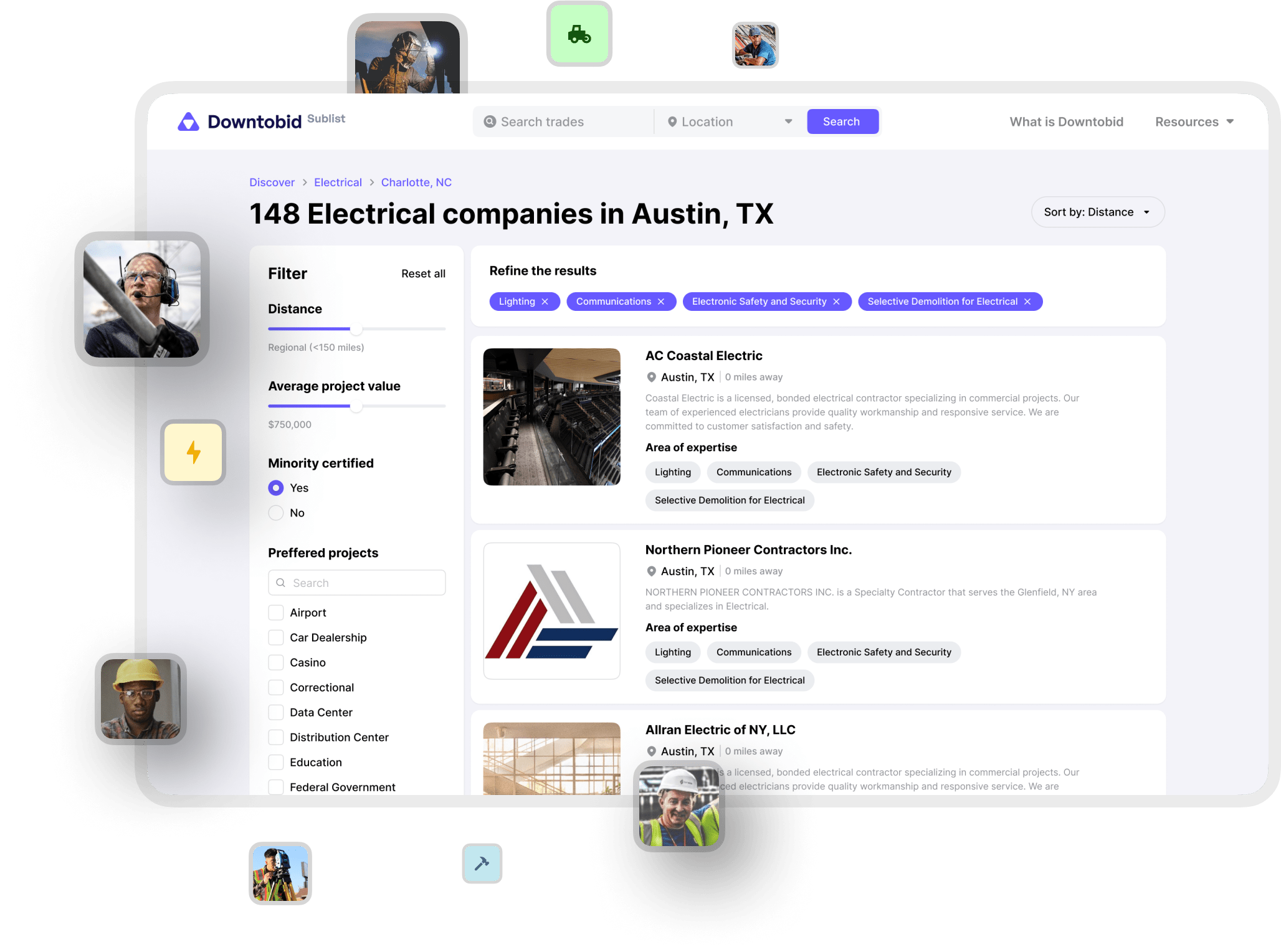
How Downtobid Works
Our software is straightforward to use, even for beginners. We understand simplicity yields better results and saves our users time and effort. Here’s a step-by-step process for using our software.
Click here to get started with a demo.
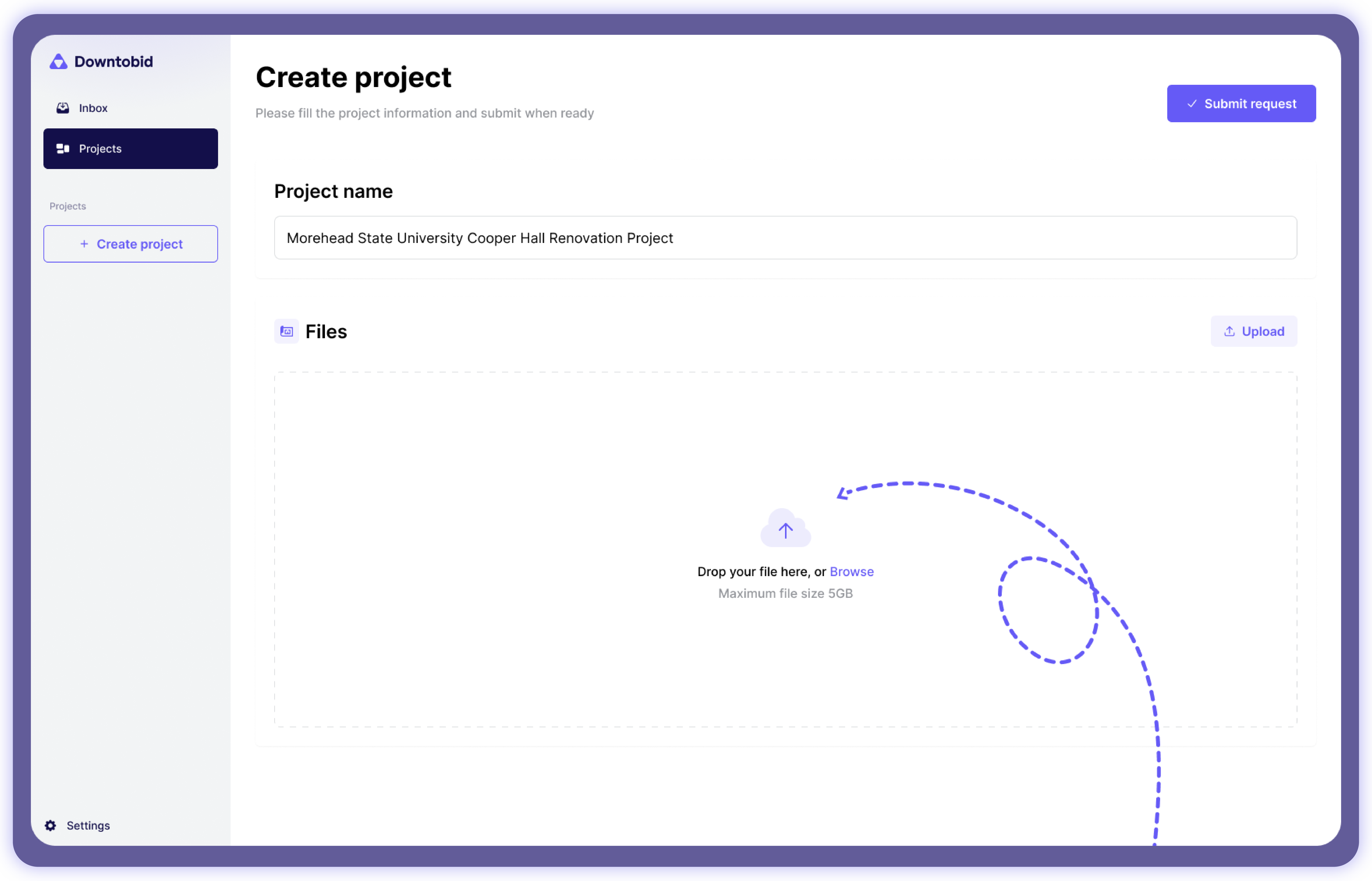
You’ll be prompted to upload your construction plans, which must be in PDF format and not exceed 1GB. Enter a valid email address to be updated once the process is completed.
After successful upload, our AI starts scanning the documents, which takes between 10 and 30 minutes. You’ll receive an email alert once the process is completed.
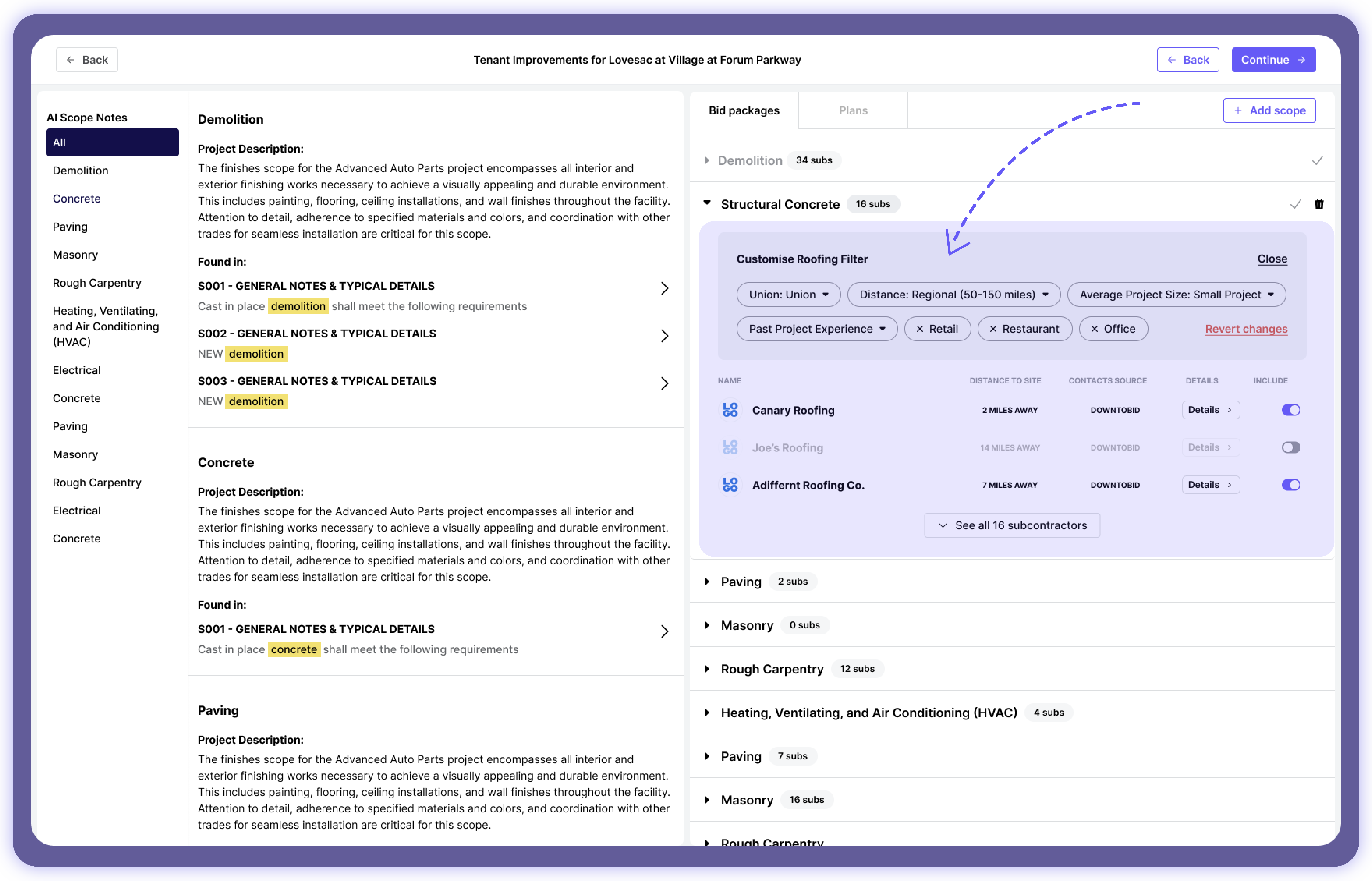
You must log in to your dashboard to access the newly created bid documents. Each document contains the following:
- A bid package summary.
- Plan sections with detected scopes.
- A list of recommended local subs matching each detected scope.
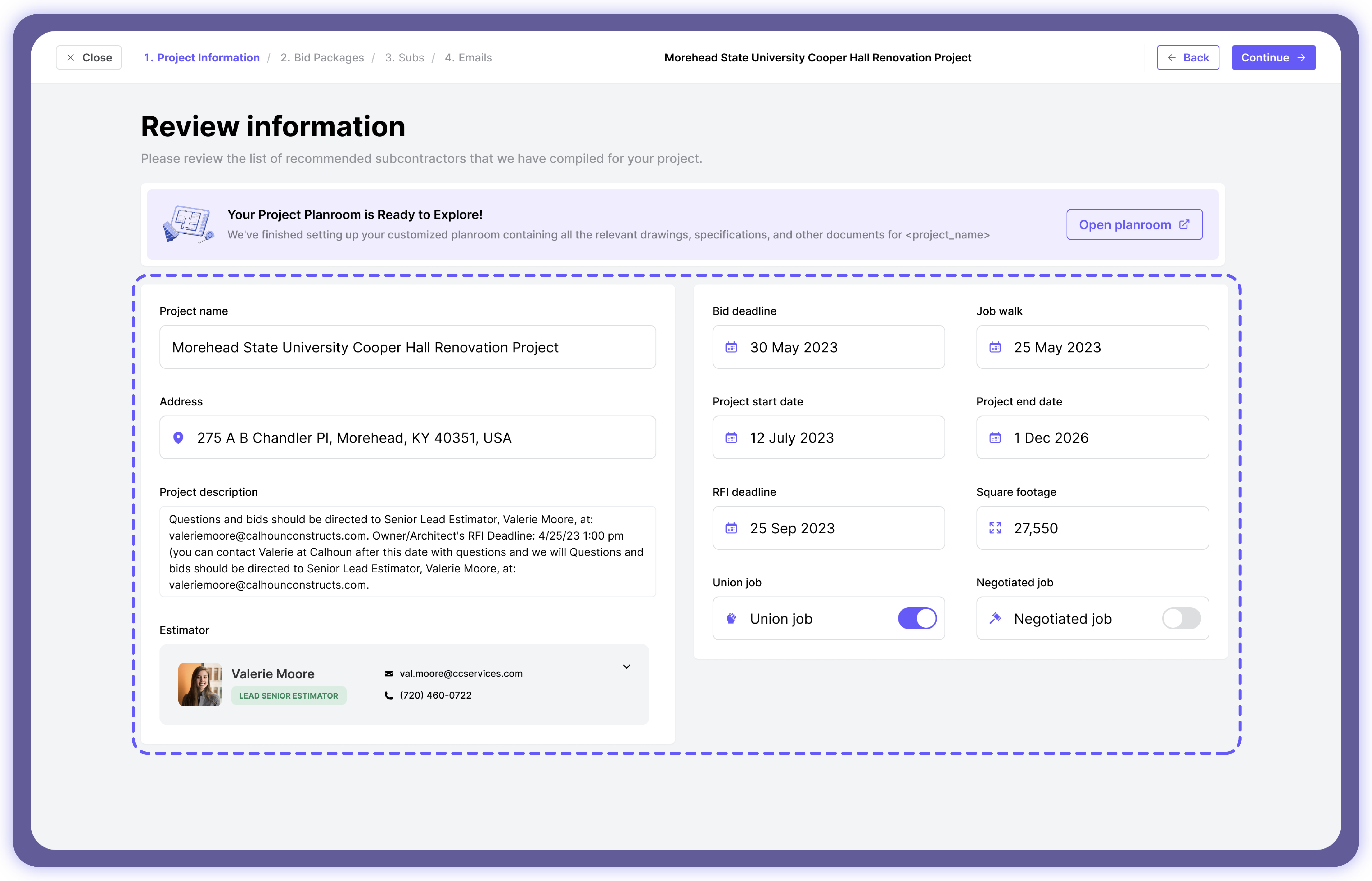
Auto-Proposed Bidding Schedule
We help general contractors reach the best-qualified subs through an auto-proposed bidding schedule. Our software scans the desired subs’ online activities and schedules the bid invites at optimal times. This approach ensures you reach the subs when they’re online and actively looking for projects.
We also have timely spaced follow-ups for subcontractors who are yet to respond. Doing so ensures you don’t overwhelm them with emails and maintains the project’s seriousness.
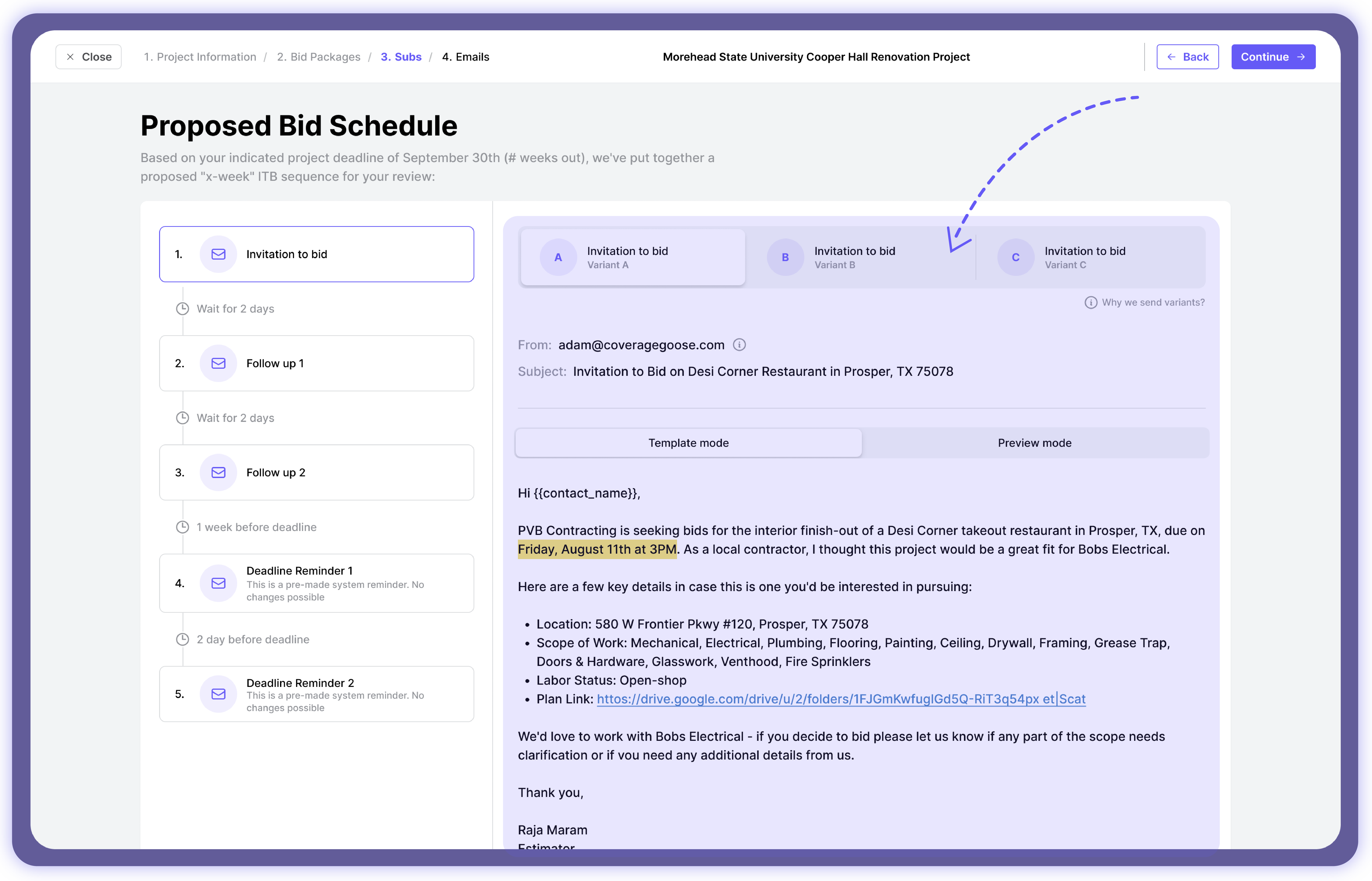
Sub-Centric Planroom
Our Planroom is different from our competitors in several ways:
First, it’s free to access, and you don’t need an account.
We have also titled and labeled all documents to help you track specific documents without reviewing hundreds of pages.
Our Planroom has four specific folders:
- Plans
- Specs
- Photos
- Misc
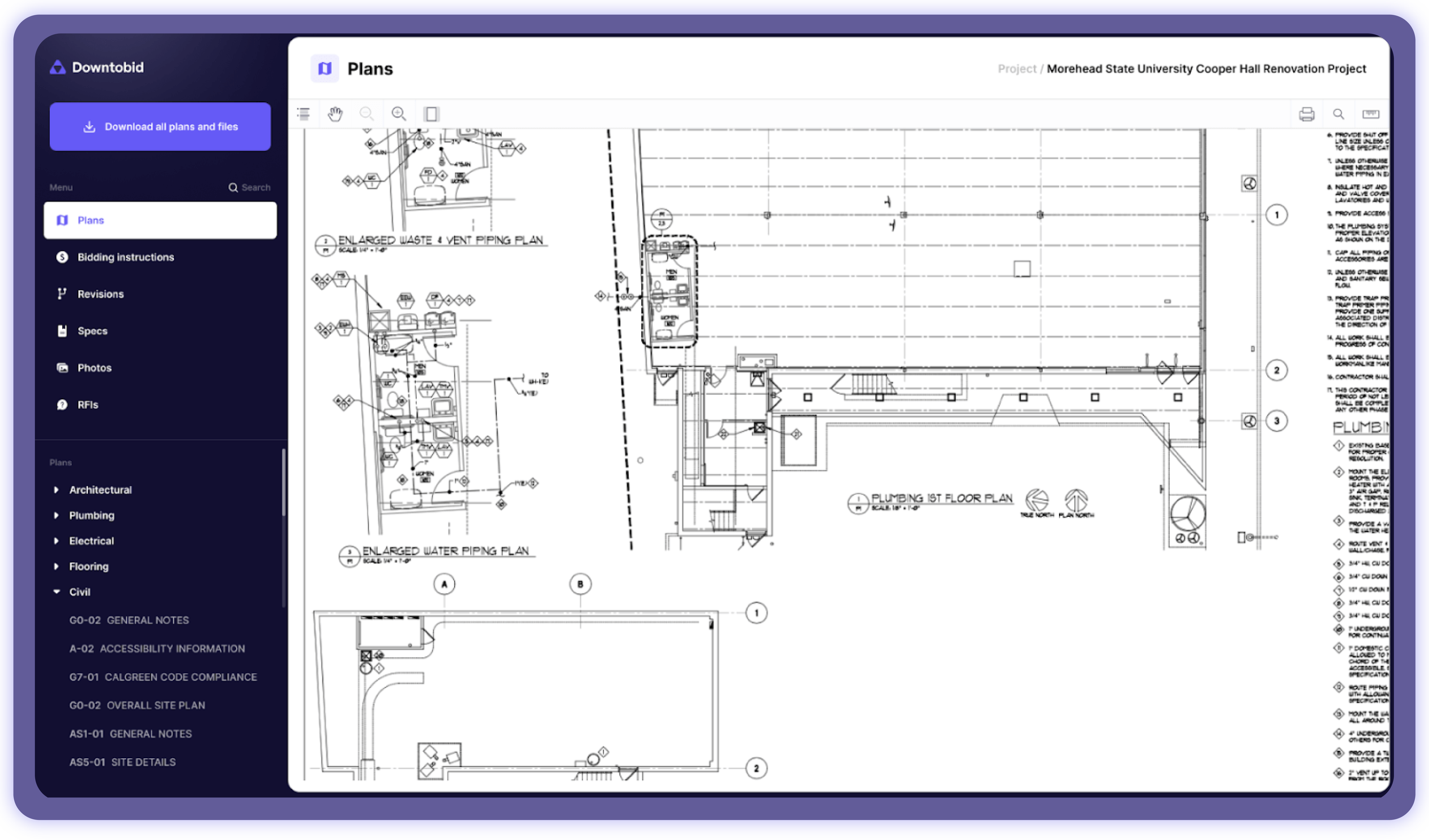
Our AI also categorizes responses with filters as not bidding, interested, and actively bidding to provide a precise snapshot of project interest.
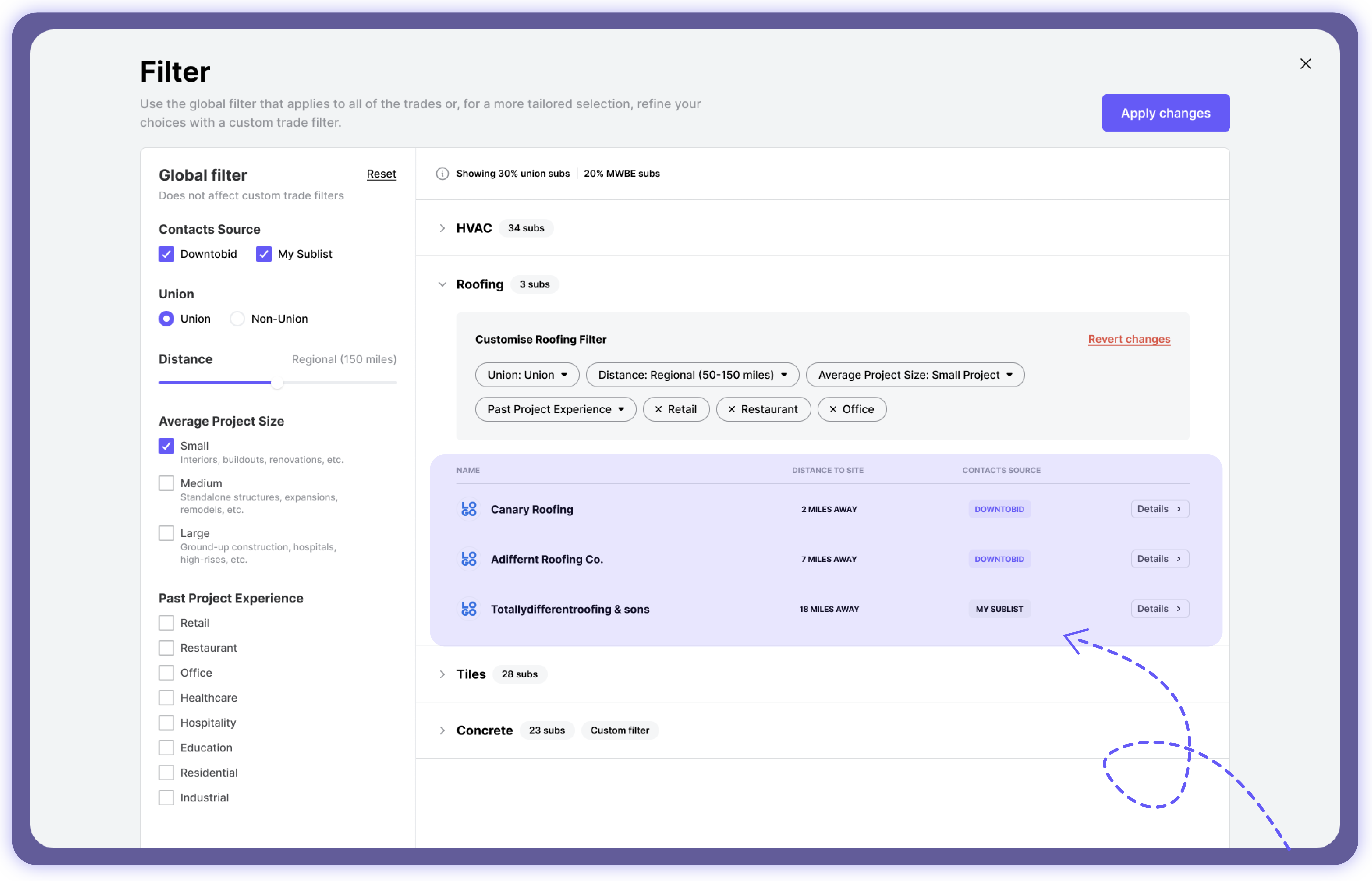
Click here for a free demo. We'll show you why Downtobid is among the most innovative artificial intelligence companies in the construction industry.
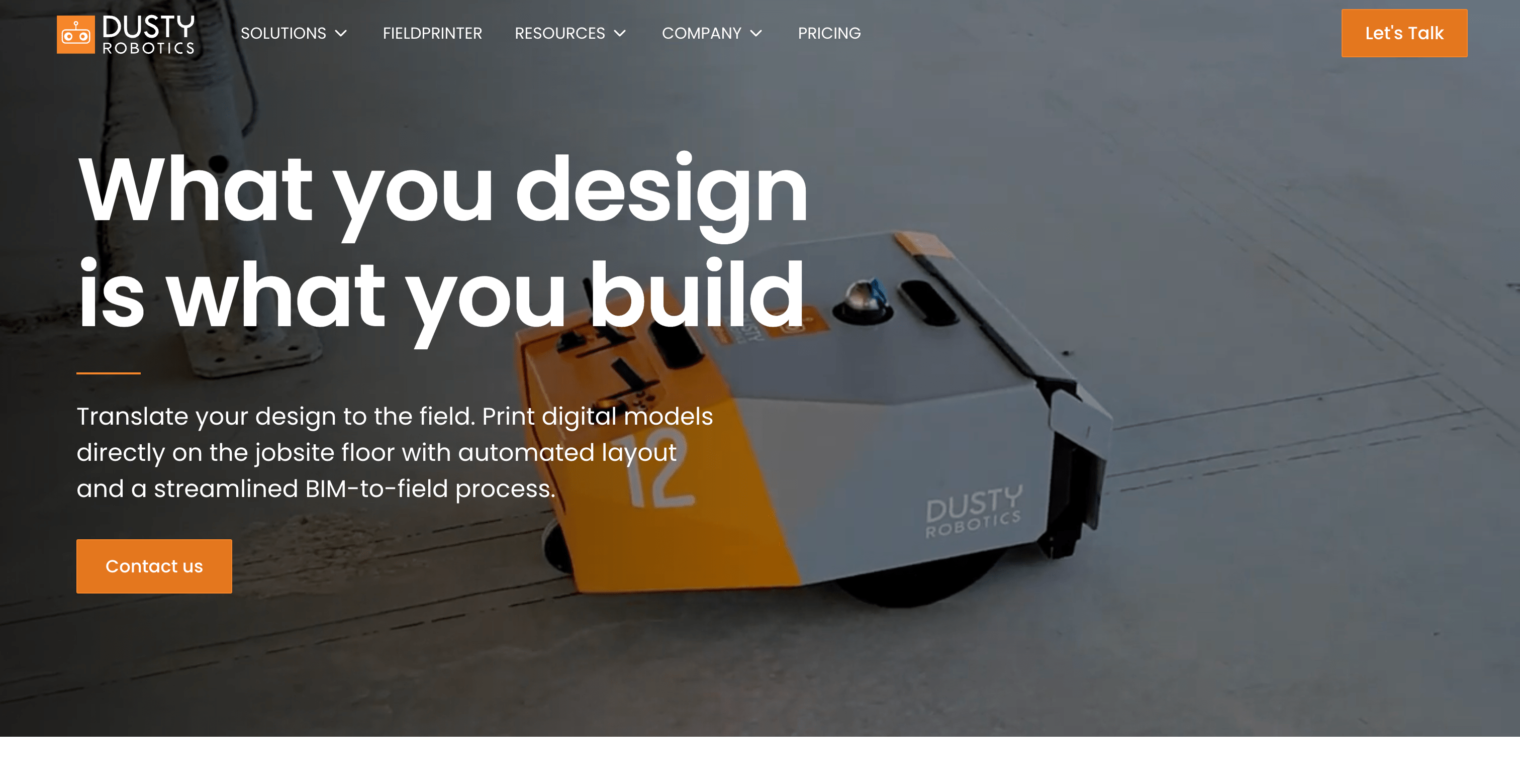
2. Dusty Robotics
Known for operating 60% faster and with 95% precision than its competitors, Dusty Robotics is an ideal construction AI company for medium and large-scale construction companies. Dusty Robotics has amazing features that handle commercial and residential projects.
However, the high cost of software is problematic for small construction companies. The company is also undergoing constant updates and maintenance, where you’ll likely experience buggy performances.
Pros
- Versatile enough to handle different projects.
- Remarkable accuracy and precision.
- Accelerates the construction process.
- Self-learning artificial intelligence that keeps improving.
Cons
- The robots could replace human labor.
- Higher initial investment.
- Higher maintenance costs.
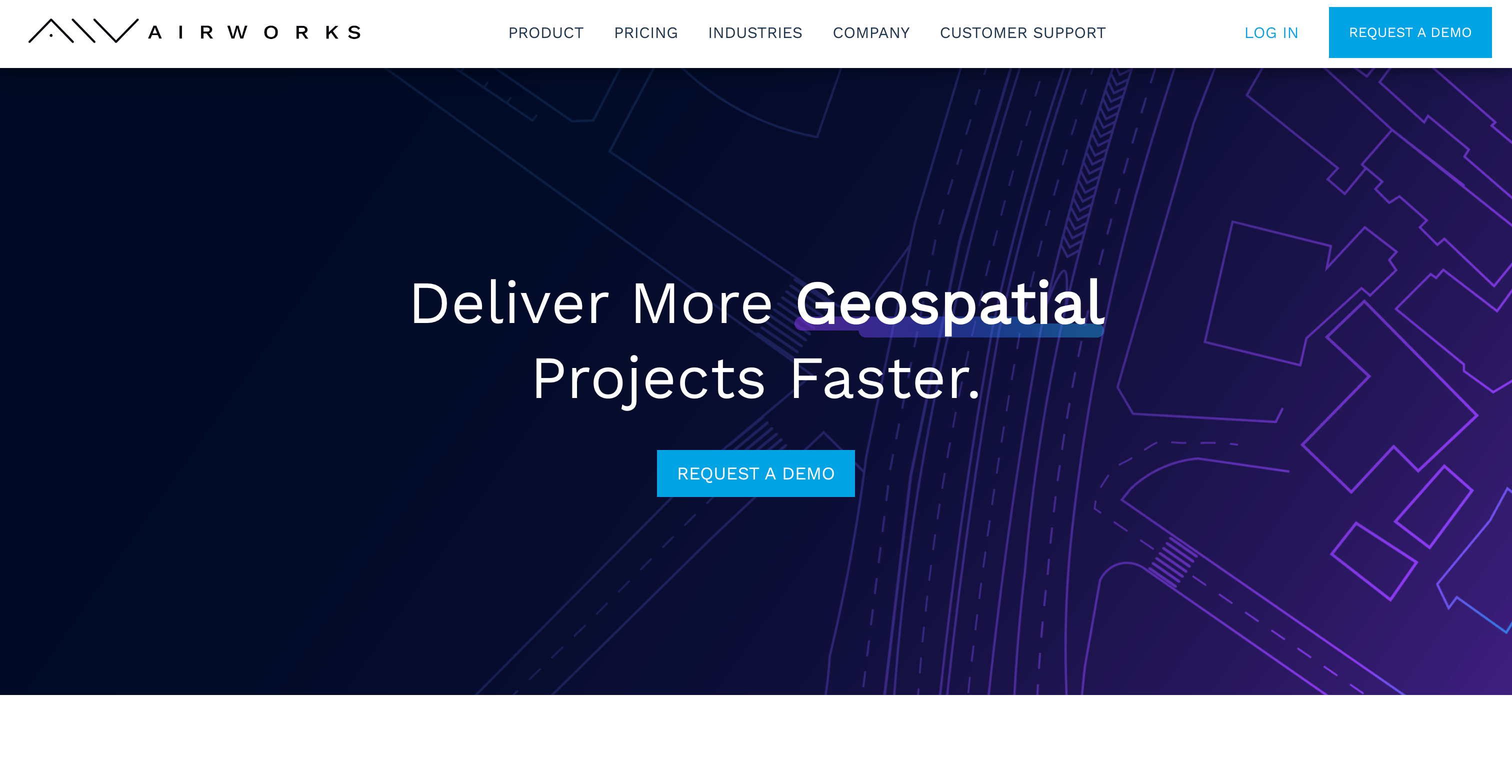
3. AirWorks
AirWorks.io is a revolutionary aerial construction project management AI capable of integrating with diverse sensors and drone hardware. It’s perfect for collecting aerial data on construction sites.
The software analyzes the high-pixel aerial images captured by drones to identify features such as roads, concrete pads, buildings, and sidewalks.
The artificial intelligence then uses these images to generate computer-aided designs (CAD) of the construction site to improve project planning and task management. Unfortunately, the construction AI company isn’t of much use to projects that don’t require drones and aerial data collection. Let's review why this tool is among the best AI project management tools.
Pros
- Advanced data collection and analysis.
- Compatible with different drone hardware.
- Applicable on different projects requiring drone services.
Cons
- Expensive for smaller construction projects.
- Useless to projects that don’t need aerial services.
- A steep learning curve.
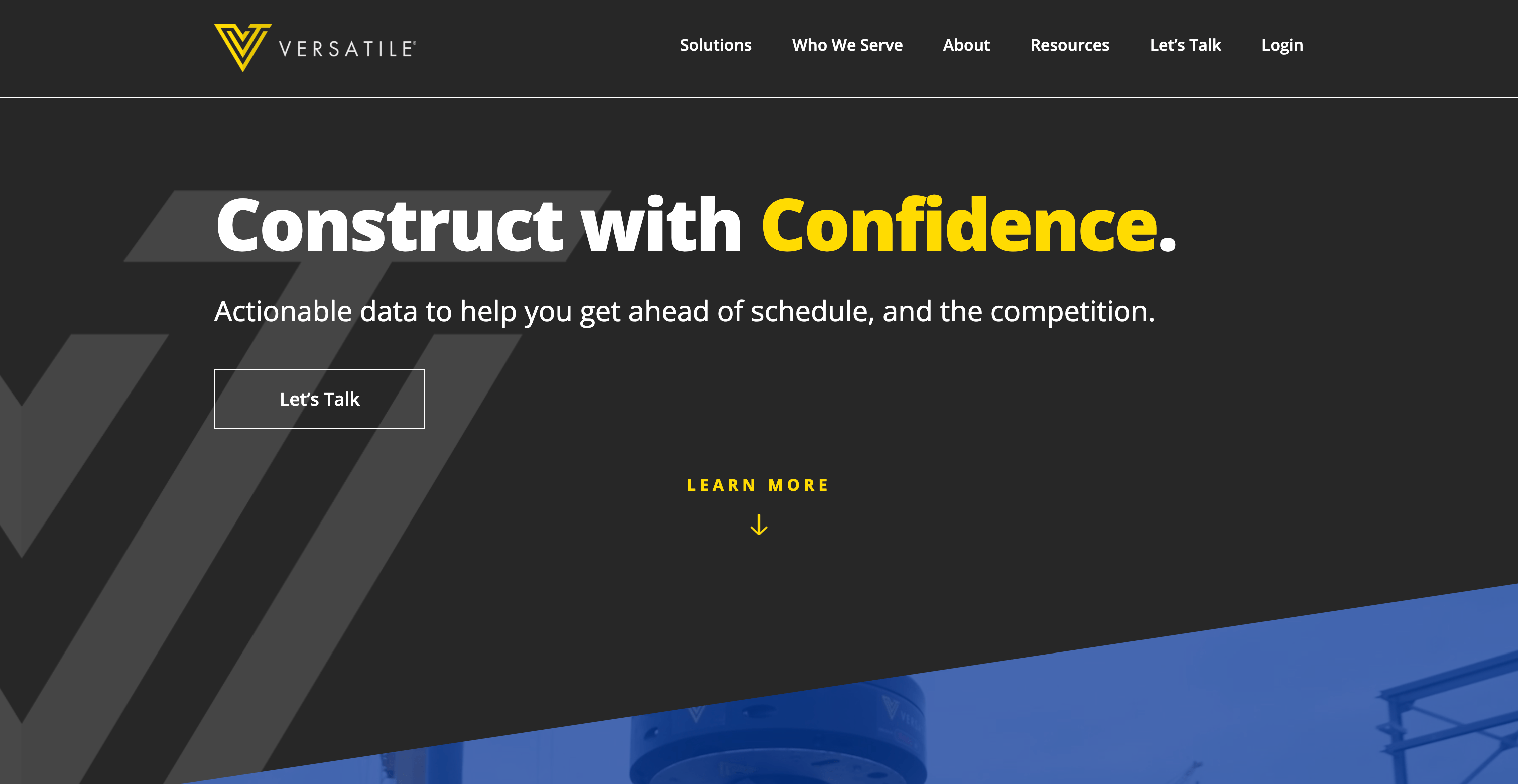
4. Versatile
If you want remote construction site monitoring, then Versatile is your best pick. The AI-powered software uses sensors and cameras to track equipment usage, material movement, and workers’ activities. Construction managers use it to track project progress and identify issues earlier on.
Artificial intelligence works with computer vision algorithms to track people, materials, and equipment on construction sites. It can also track specific objects, such as workers and materials, to identify resource usage and potential wastage.
Pros
- Customizable to fit different operations.
- Sophisticated AI for better progress tracking.
- Real-time data processing.
Cons
- Daunting learning curve.
- Higher initial investment costs.
- Not ideal for small operations.
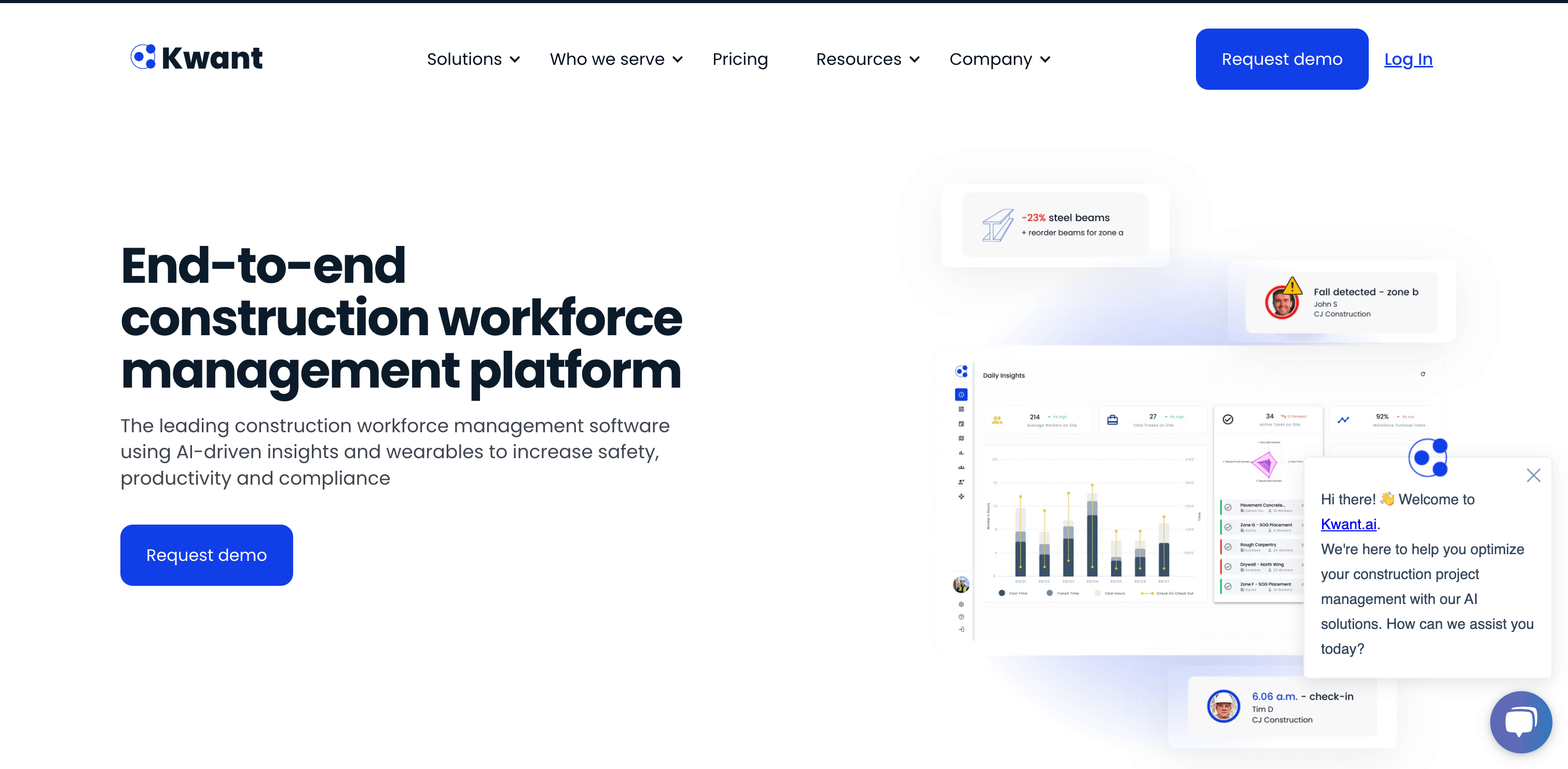
5. Kwant.ai
Kwant.ai is a sophisticated construction project management software best known for workforce management, predictive analysis, and schedule optimization. The platform analyzes data collected from different construction stages and departments to help construction managers make informed decisions.
It uses industry trends and historical data to predict potential delays and risks. Construction professionals use this information to take proactive measures and mitigate risks. It also compares actual results with planned schedules to identify problems and make improvements.
Pros
- Offers customizable alerts and real-time insights.
- User-friendly interface.
- Improves safety protocols.
Cons
- Steeper learning curve.
- Expensive for smaller businesses.
- It’s not ideal for construction companies that don’t use data-driven analytics.
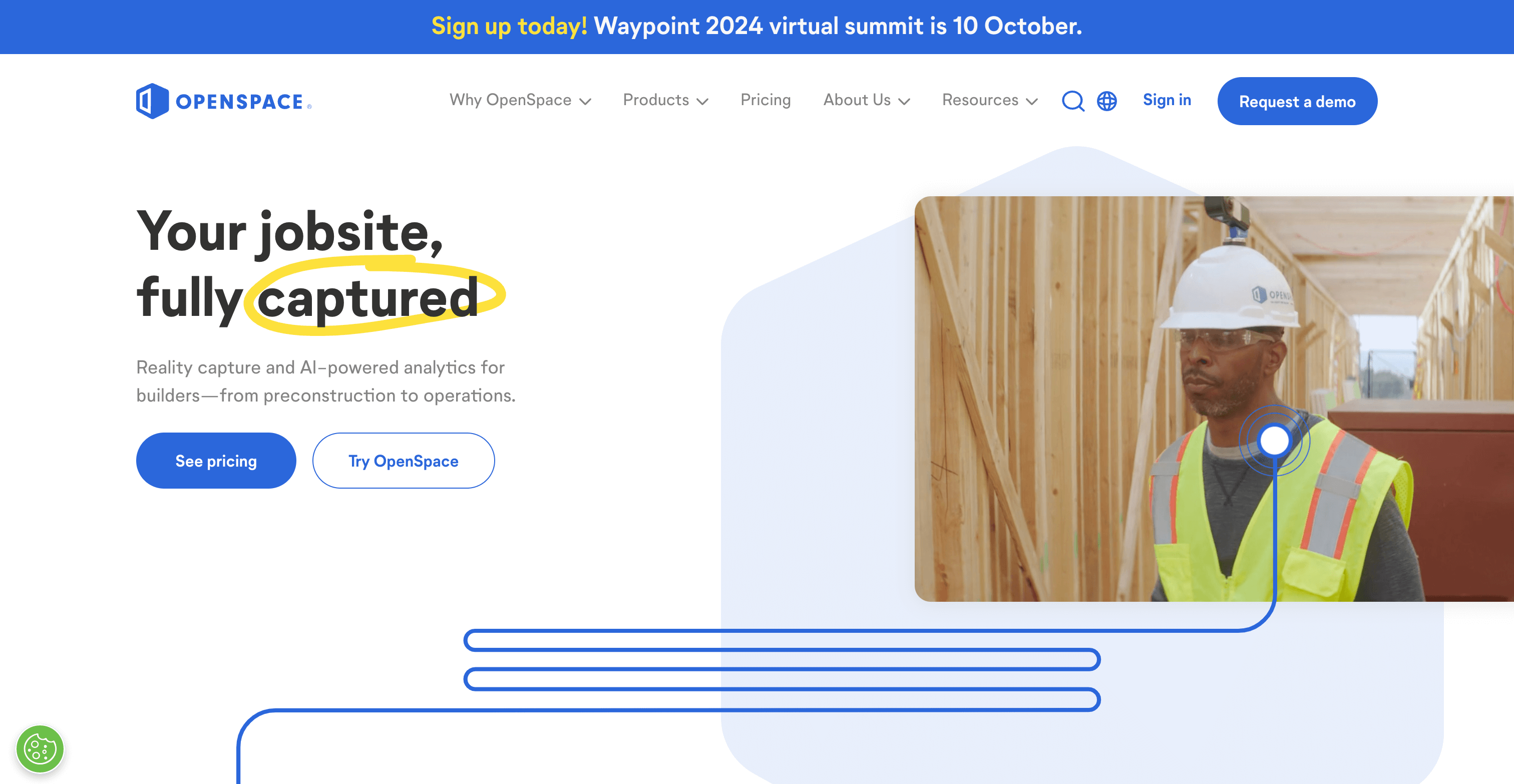
6. OpenSpace
OpenSpace is best known for creating realistic 3D models of construction projects. Construction professionals use these models for progress tracking, virtual tours, and clash detection. The AI uses sophisticated algorithms to stitch together construction site images and create complete 3D models.
It can also identify and label objects, such as walls, windows, and doors, making the 3D models more detailed. OpenSpace AI can also detect changes in construction to track progress and identify potential issues before they arise.
Pros
- Compatible with BIM 360 and Procore
- Reduces documentation timelines.
- Comprehensive visual insight.
Cons
- Not suitable for small-scale projects.
- Requires a steeper learning curve.
- Higher initial investment.
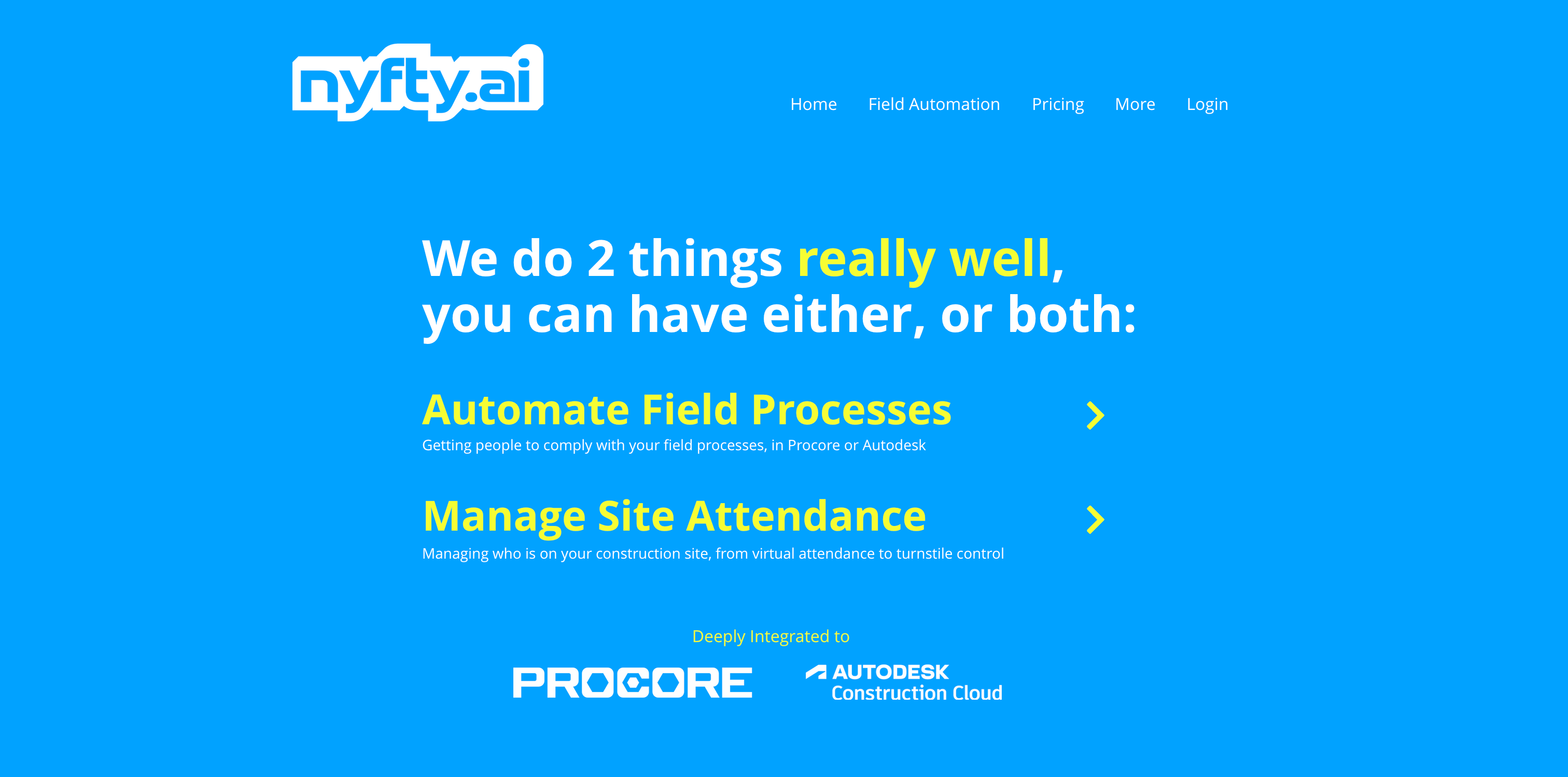
7. Nyfty.ai
Nyfty.ai is best known for streamlining the procurement process, ensuring all resources needed to complete the project are available. The software automates material ordering and management to prevent wastage and shortages. This approach ensures the work doesn’t stall and the project is completed on time.
The artificial intelligence identifies the required materials, generates purchase orders, and connects with local suppliers to ensure timely delivery. It also tracks material delivery and will alert you in case of any changes or delays.
Pros
- Automated inventory management.
- Exceptional customer support.
- Centralized communication.
Cons
- Limited customization.
- Higher upfront investment costs.
- Not suitable for small-scale operations.
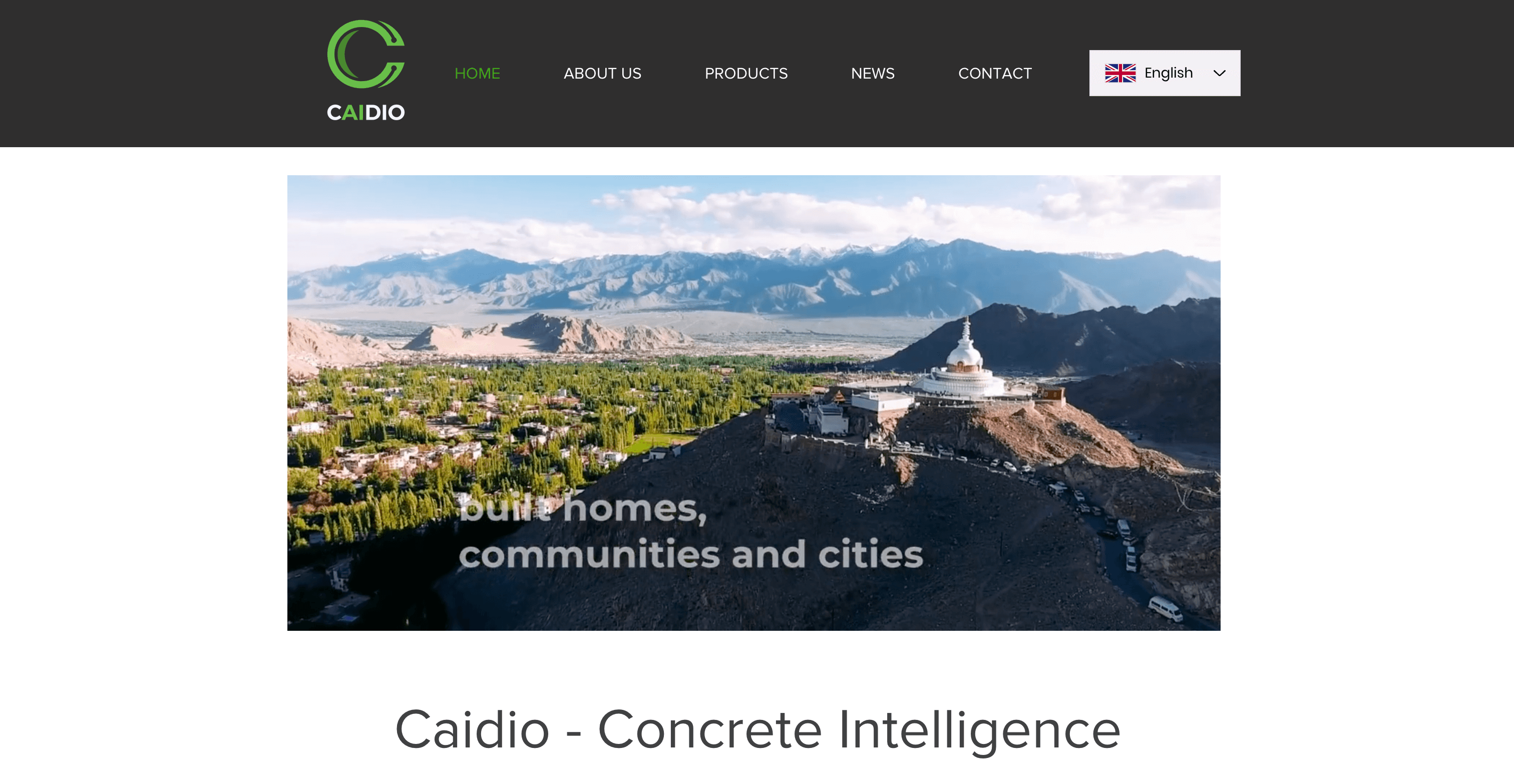
8. Caidio
Tracking construction progress can be overwhelming and time-consuming. Luckily, Caidio simplifies the process by utilizing AI. The software uses images and videos from construction sites to detect changes and identify progress. It focuses on material stockpiles, equipment placement, and structures to determine how far the project has gone.
The machine learning algorithm compares images from different time points. This approach helps construction managers determine if the construction pace is acceptable and which changes are required, if any.
Pros
- Real-time information sharing.
- Improved communication.
- Improves collaboration.
Cons
- Requires a steeper learning curve.
- It doesn’t suit projects inclined towards traditional project management methods.
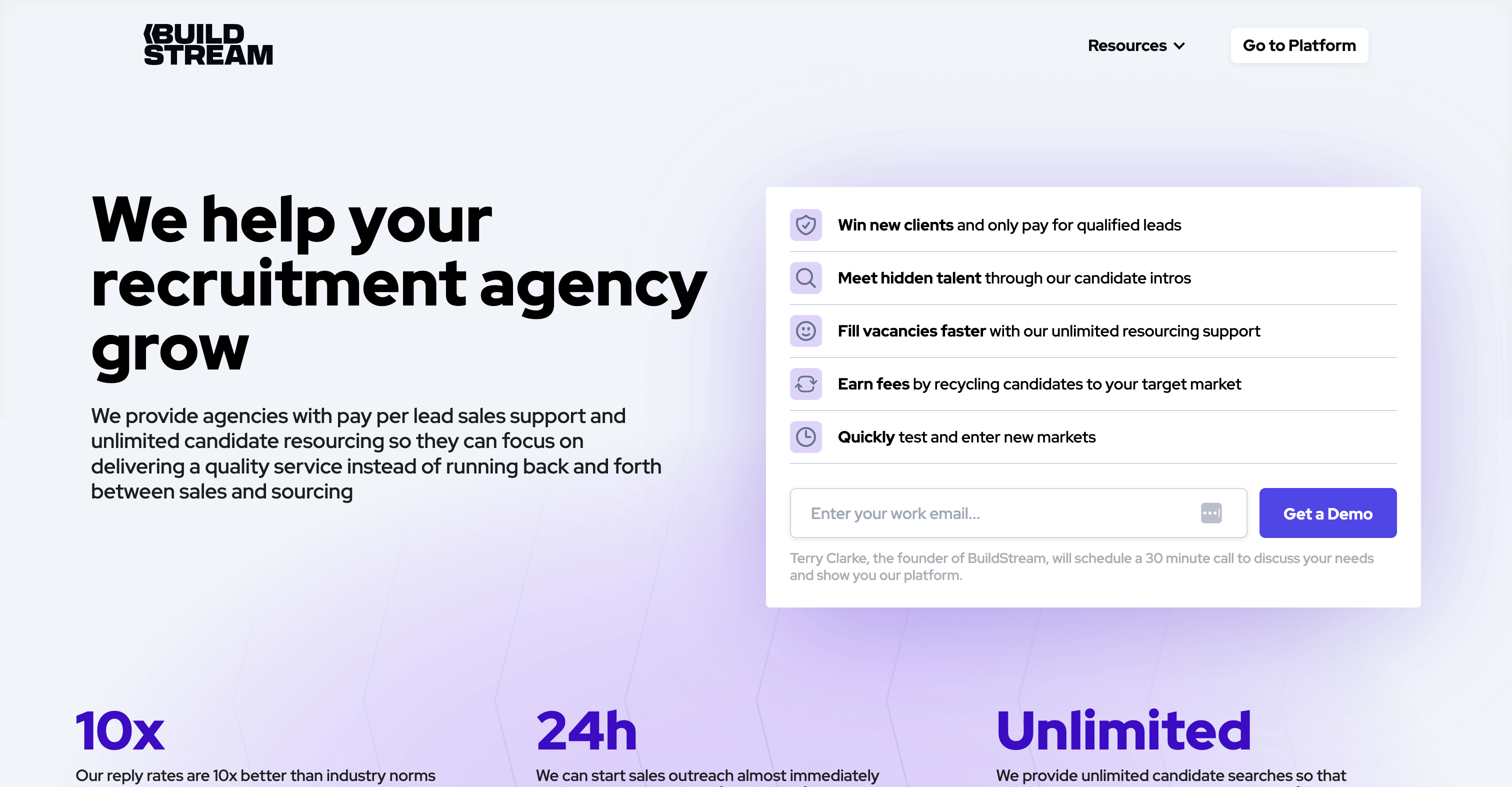
9. BuildStream
Construction scheduling is a nightmare for any construction manager. BuildStream helps streamline scheduling through machine learning algorithms. The algorithms analyze historical project data to identify trends and patterns to predict potential bottlenecks and delays in scheduling.
The AI is perfect for risk assessment, ensuring the construction team completes the project on time. It also uses scenario project planning, simulating certain outcomes to help construction managers understand the impact of their decisions.
Pros
- Real-time data sharing.
- Improved collaboration.
- Data-driven insights.
Cons
- Not cost-effective for smaller operations.
- It requires a learning curve.

10. Procore Technologies
Last but not least is Procore Technologies, a popular construction management platform that utilizes AI in different operations, such as scheduling, bid management, and progress tracking.
Procore uses AI for predictive scheduling. It analyzes historical data to identify patterns that cause delays. This feature helps project managers take corrective measures to ensure the project is completed on time.
The AI enhances field collaboration through real-time information sharing to ensure everyone works on the latest information. It also optimizes resources, such as material, labor, and equipment, to prevent shortage and wastage. See more Procore substitutes here.
Pros
- Integrates with various construction management tools.
- Cloud-based platform.
- Strong support and community.
Cons
- Limited customization options.
- Vendor lock-in
- Steep learning curve.
Final Thoughts
Construction AI companies have improved the construction industry by simplifying what was once complex. You can now use Downtobid to streamline preconstruction, AirWorks for aerial data analysis, and OpenSpace for 3D modeling. With AI only in its infancy stage, we should expect nothing but progress in the future.
Frequently Asked Questions
How is AI transforming the construction industry?
AI is revolutionizing construction by automating manual work, enhancing safety protocols, and optimizing project management. From reading complex drawings to managing subcontractors, AI tools improve accuracy, save time, and boost collaboration, making projects run smoother and faster.
What makes Downtobid stand out among construction AI companies?
Downtobid uses AI to read construction drawings, automatically identify bid packages, and match qualified subcontractors. Its personalized bid invites increase subcontractor responses by 30%, streamlining preconstruction and saving months of manual work for general and trade contractors alike.
What types of AI solutions do other leading construction AI companies offer?
Innovators like Dusty Robotics specialize in robotics automation, AirWorks uses drone data for aerial monitoring, OpenSpace creates detailed 3D project models, and Kwant.ai offers workforce management and predictive analytics. Each solves a specific construction challenge with advanced AI algorithms.
Are AI construction tools only for large companies?
Many AI platforms involve steep learning curves and upfront investments, making them ideal for medium to large operations. However, the industry is evolving rapidly, and accessible solutions like Downtobid show how AI can benefit subcontractors and smaller teams by automating key workflows without huge costs.